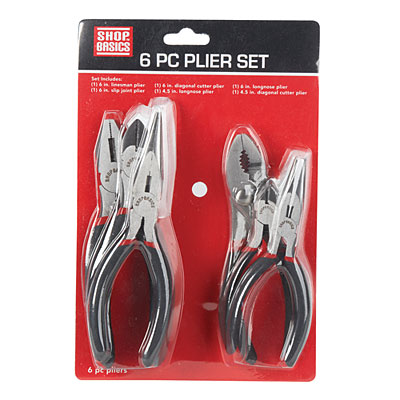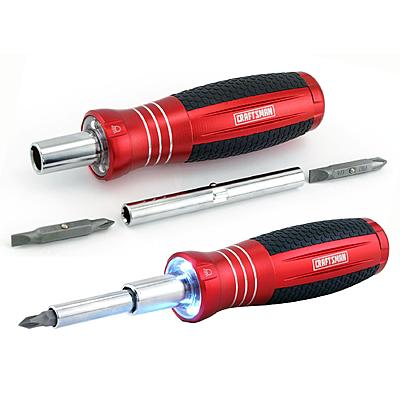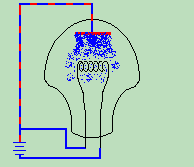


ToolsAt this stage of the game, I'm fairly certain you are tired of just reading, and want to get your hands into the guts of electronics (if you haven't already). I have already presented you with a couple of projects you could play with (like a power supply), but honestly - there are certain tools and test equipments that you WILL need in order to be successful in electronics.Jenson makes some really cool tool kits, but in my honest and most humble opinion, they are more money than they are worth, and frankly, usually don't have what YOU need when you need it. Specialized tool kits are for special jobs, but generically, this is what you will need for most any job you come across in electronics:

 I've found that the above set (minus the screwdriver) can be had from Sears, Wal-Mart, Harbor Freight, or just about any hardware store for under $20. The Screwdriver is the type with replaceable tips. 2 phillips, 2 standard, and the handle can be used as 2 different sized nut-drivers (both sizes commonly used in electronics). Then come your specialty electronics tools As for soldering, I have another course that covers that as well as the best equipment for the job. Multimeters? Entire websites are dedicated to the sales of them. In short - once you learn how to properly use a multimeter - you can get by with a cheap generic one you can buy for a couple of dollars. However, there are special jobs that require special meters - like a precision True RMS meter, which gives you real voltages instead of averaged ones. VERY handy if you know the difference, but if you can't afford that - often you can simply do the math. That's it. Those are the tools you as an electronics tech or Field Service Engineer will need more than any others. I carry all that around in a small tool bag, and it handles MOST (but certainly not all) of what I do. I call that my 90% bag. Certainly you can spend millions of dollars on tools and test equipment in the electronics field - but for MOST jobs - you can get by with less than $40 worth of tools. |

| (On The Following Indicator... PURPLE will indicate your current location) | ||||||||||||||||||||||||
| 1 | 2 | 3 | 4 | 5 | 6 | 7 | 8 | 9 | 10 | 11 | 12 | 13 | 14 | 15 | 16 | 17 | 18 | 19 | 20 | 21 | 22 | 23 | 24 | 25 |
| 26 | 27 | 28 | 29 | 30 | 31 | 32 | 33 | 34 | 35 | 36 | 37 | 38 | 39 | 40 | 41 | 42 | 43 | 44 | 45 | 46 | 47 | 48 | 49 | 50 |
| 51 | 52 | 53 | 54 | 55 | 56 | 57 | 58 | 59 | 60 | 61 | 62 | 63 | 64 | 65 | 66 | 67 | 68 | 69 | 70 | 71 | 72 | 73 | 74 | 75 |
[COURSE INDEX] [ELECTRONICS GLOSSARY] [HOME]
| Otherwise - please click to visit an advertiser so they know you saw their ad! |
